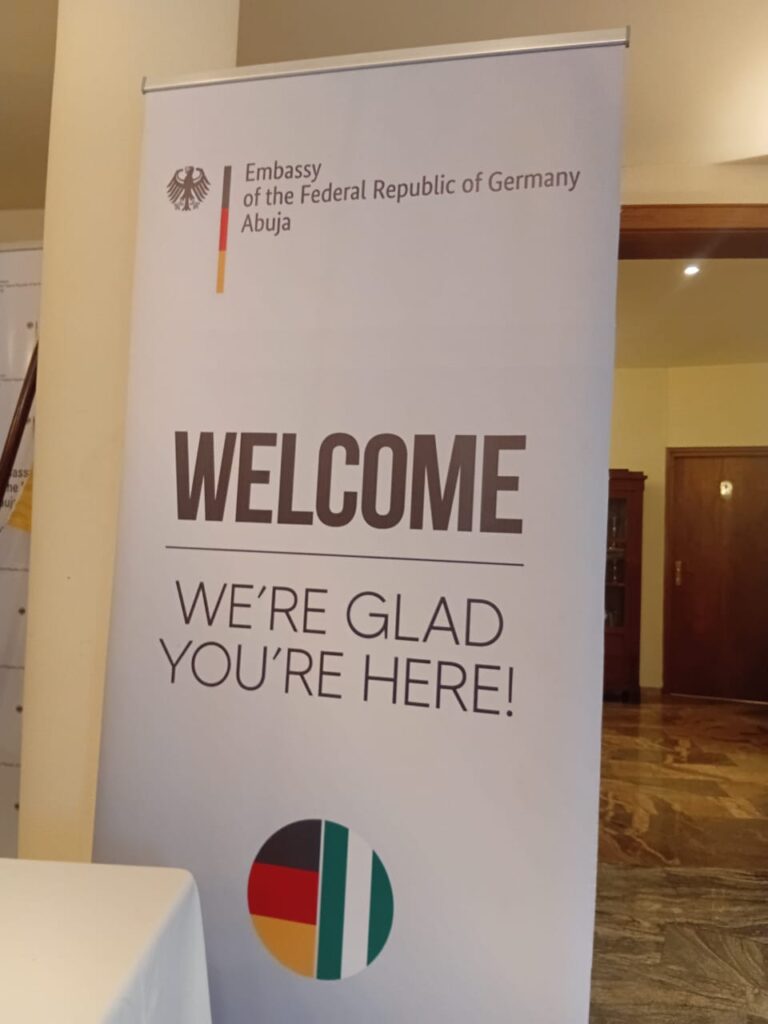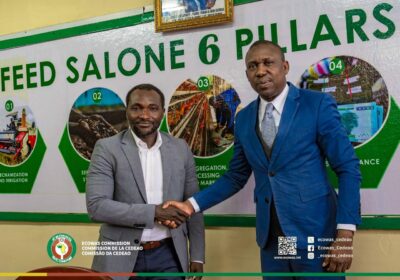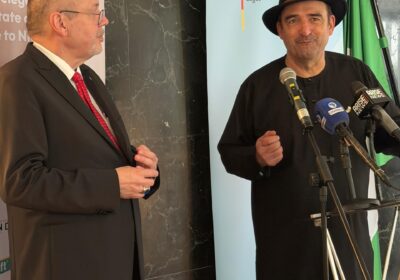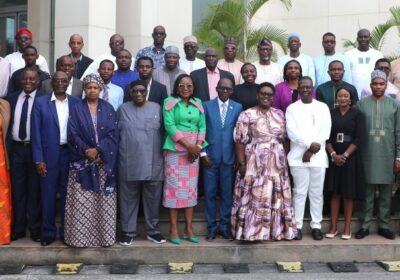Nigeria–German Relations: Ambassador Annett Holds Media Briefing on the Current and Future Ties.— Says Nigeria is Germany’s 2nd Biggest Trading Partner in Sub-Saharan Africa with Trade Volume of 3 Billion Euros.
By Raymond Enoch
Germany’s Ambassador to Nigeria, H.E. Annett Günther, has reaffirmed her country’s commitment to strengthening ties with Nigeria, describing the partnership as strategic, dynamic and mutually beneficial. She made this known during a press conference held at the German Embassy in Abuja on Thursday 23rd October 2025, where she addressed key aspects of the current and future trajectory of Nigeria–German relations.
Ambassador Günther began by commending the Nigerian press for its consistent role in promoting democratic values and fostering accountability. She said: “time and again, the Nigerian press has proven that it is free, pluralistic and critical. This is not only a contribution to Nigeria’s democracy, but a precondition of a free and wealthy society.” She noted, adding that open dialogue and a free media are essential to national progress and mutual understanding between nations.

The press conference is coming ahead of the Nigerian–German Binational Commission, scheduled to hold in Berlin in November 2025. The meeting, would be co-chaired by the foreign ministers of both countries, and will discuss a broad range of bilateral issues including trade, power, energy, climate, culture, education, migration and border management. The envoy described the forum as an important platform to lift relations between the two nations to another level, particularly as both countries celebrate 65 years of Nigerian independence and 65 years of diplomatic relations.
Ambassador Günther underscored the deep similarities between Nigeria and Germany, saying both nations share democratic ideals and a strong belief in the rule of law. “Both Nigeria and Germany are Federal Republics, the most populous in their region and the most powerful economies on their continents,” she said. “We share the same values: we are both freedom-loving and democratic. And we want the world to be governed through the strength of the law, and not the law of the strongest.”
On economic relations, the Ambassador disclosed that Nigeria is Germany’s second biggest trading partner in Sub-Saharan Africa with a total trade volume of three billion euros. She noted that trade between the two countries grew by 30 percent this year, reflecting Nigeria’s economic recovery. According to her, more than 90 German companies are active in Nigeria, indirectly creating about 17,000 jobs, with additional investments expected in the energy and pharmaceutical sectors.
She highlighted the ongoing Presidential Power Initiative in partnership with German energy giant Siemens, which has entered its second phase and is expected to add about seven gigawatts to Nigeria’s national grid. She also pointed to the growing cooperation in the gas sector, focusing on eliminating gas flaring and improving Nigeria’s carbon footprint.
Ambassador Günther reaffirmed Germany’s commitment to supporting Nigeria in military training and counter-terrorism efforts. She revealed that both nations have launched their first Bilateral Annual Military Program to deepen cooperation and enhance joint planning. Next month, high-level military staff talks will be held in Abuja for the first time, a development expected to strengthen future collaboration in security and defence.
On internal security, the envoy disclosed that Germany has supported Nigeria’s police reform and law enforcement efforts with approximately 900,000 euros spent between 2024 and 2025 on training, logistics, and infrastructure. She cited the Supporting Police Accountability and Transformation Project, implemented with the UNDP, which has trained 600 instructors, refurbished police training colleges, and promoted community policing and gender inclusion within the Nigeria Police Force.
Turning to humanitarian and development cooperation, Ambassador Günther expressed concern over Nigeria’s worsening humanitarian situation, with about 31 million people facing food insecurity and 3.5 million children at risk of severe malnutrition. She reaffirmed Germany’s support for humanitarian programs focusing on food security, health, protection for women and children, and climate resilience. “Humanitarian assistance can provide vital support, but sustainable change arises through local action. We are committed to a partnership that promotes shared responsibility and strengthens long-term resilience,” she said.
She mentioned that Germany is also investing in stabilization projects across conflict-affected states such as Borno, Adamawa and Yobe. One notable project, she said, is the reconstruction of Ngarannam village in Borno State, destroyed by Boko Haram but rebuilt with homes, schools and livelihood opportunities to strengthen local resilience.
In the area of cultural and educational exchange, Ambassador Günther announced that the Goethe-Institut has expanded its programs from Lagos to Abuja, offering German language classes and cultural activities. She revealed that a new partnership with the Nigerian film industry will begin next year, with a German Chamber of Commerce delegation visiting Lagos in December to explore collaborations.
On migration and people-to-people relations, she disclosed that last year, the German Embassy in Abuja and the Consulate General in Lagos issued over 1,400 long-term visas for study, employment and family reunification, and about 6,200 short-term visas for business and tourism. She assured that both missions remain committed to granting visas to properly documented applicants as part of efforts to strengthen bilateral engagement.
As Nigeria and Germany mark 65 years of diplomatic ties, Ambassador Günther reiterated her belief that both nations are entering a new era of cooperation founded on shared values and mutual respect. “Much can be achieved together if we realise how much we have in common and how much our interests align,” she said.
The upcoming Binational Commission in Berlin is expected to set a renewed tone for Nigeria–Germany relations, redefining the partnership through deeper collaboration in trade, energy, governance, security and culture, while strengthening the bridge between Africa’s most populous nation and Europe’s largest economy.









